Reagan's Military Adventures
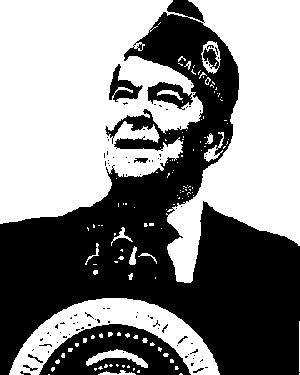
"When you meet the President you
ask yourself, 'How did it ever occur to anybody that he should be
governor, much less President?'"
--Henry Kissinger, addressing a small group of scholars at the
Library of Congress (unaware of the presence of a reporter), April 1986
The following transcribed text is from a taped conversation between President Richard Nixon and his national security advisor, Henry Kissinger on the morning of November 17, 1971:
Nixon: What’s your evaluation of Reagan after meeting him several times now.
Kissinger: Well, I think he’s a—actually I think he’s a pretty decent guy.
Nixon: Oh, decent, no question, but his brains?
Kissinger: Well, his brains are negligible. I—
Nixon: He’s really pretty shallow, Henry.
Kissinger: He’s shallow. He’s got no ... he’s an actor....
Nixon: It shows you how a man of limited mental capacity simply doesn’t know what the Christ is going on in the foreign area.
The Beirut Fiasco -- Reagan Decides to
Intervene in Lebanon's Civil War
The deaths lie on him and the defeat
in Lebanon lies on him and him alone.... The trouble with this
fellow is he tries to be tough rather than smart."
--House Speaker Tip O'Neill on President Reagan, April 1984
In the spring of 1983, President Reagan
and his team of hawkish advisors decided to intervene in Lebanon's civil
war on behalf of Christian President Amin Gemayel. On March 24, the 24th Marine Amphibious Unit was dispatched to Lebanon where
Muslim and Christian factions were fighting.
On April 28, 1983, a suicide bomber drove a van loaded with 2,000 pounds of explosives into the
U.S. embassy in Beirut. Sixty-three people died, including
seventeen Americans.
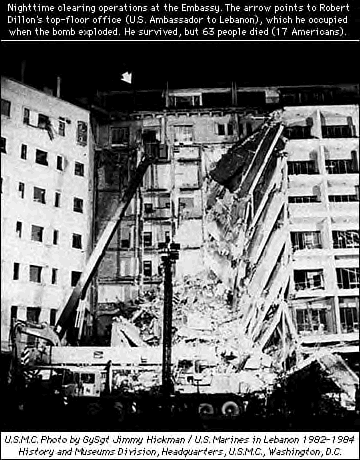
Four months later (September 6, 1983), two U.S. Marines
were killed by rocket and mortar fire. At an October 19 press
conference, Reagan was asked about the safety of the Marines in Beirut
to which he replied, "We're looking at everything that can
be done to try and make their position safer. We're not sitting
idly by."
A few days later (October 23), another suicide bomber drove a truck loaded with explosives into the
headquarters building of the First Battalion, 8th Marines, located at
the Beirut airport. The resulting explosion killed 241 American
servicemen.
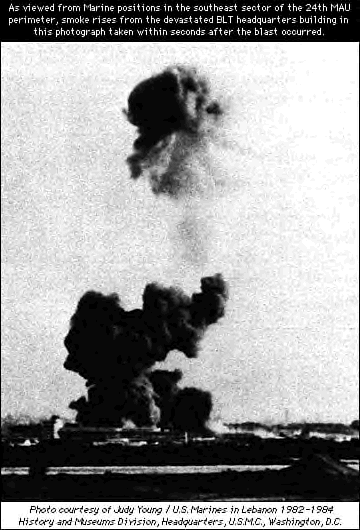
Three months later, the Reagan
administration removed American troops from Beirut and put them aboard
offshore ships. Reagan described the retreat as taking
"decisive new steps." Reagan spokesman Larry Speakes explained: "We don't consider this a withdrawal but more of a
redeployment."
The Iran-Contra
Conspiracy
"The United States gives
terrorists no rewards and no guarantees. We make no concessions;
we make no deals."
--President Reagan, June 30, 1985
"...the moral equal of our
Founding Fathers."
--Ronald Reagan, describing the Nicaraguan contras
"I guess in a way they are
counter-revolutionary and God bless them for being that. And I guess
that makes them contras and so it makes me a contra, too"
--Ronald Reagan
Thus did Reagan declare his support for
the contras--remnants from the old Somoza
regime--who were attempting to overthrow the leftist Sandinista
government of Nicaragua. Reagan hoped to sway a reluctant
American public to back the contra cause as well.
However, enlisting public support was
turning out to be a hard sell. Many Americans were wary of
the CIA-trained mercenaries due in large part to numerous reports of atrocities committed by the contras against Nicaraguan civilians.
More bad press came in the form of a CIA manual
written for the contras. The manual instructed on such things
as how to blackmail unwilling Nicaraguans into supporting the contra
cause, how
to create martyrs by arranging the deaths of fellow contras, and how to
"neutralize" Nicaraguan government officials.
Public skepticism increased further when the CIA was caught mining Nicaragua's
harbors. When Nicaragua brought charges in the World
Court against CIA aggression,
the Reagan administration announced that it would not be bound by the World
Court ruling.
Many in Congress were growing weary of CIA
recklessness, including Republican Senator
Barry Goldwater. Regarding the mining of Nicaragua's harbors
Goldwater wrote, "This is an act violating international law. It is an
act of war." Later, CIA Director William Casey would apologize to the
Senate Intelligence Committee for keeping the Nicaraguan mining a
secret.
However, the U.S. Congress was not
swayed by Casey's belated apology. In October 1984, Congress voted to cut off funding for CIA-contra operations.
With the Congressional cutoff, Casey
decided to make an end run around Congress by "handing off" contra operations to the National
Security Council (NSC). National Security Advisor John Poindexter
and NSC member Lt. Col. Oliver North were placed in charge. North and Poindexter were soon employing
every clandestine scheme they could think of to fund the contras.
During this period, unknown to the public, the Reagan
administration was selling arms to Iran in exchange for American
hostages held in Lebanon by pro-Iranian terrorists. North and Poindexter surreptitiously diverted money from these arms sales to help fund the contras--a crime for
which they would later both be convicted.
The administration had tried to
keep its weapon sales to Iran a secret. However, on November 3, 1986, the Beirut
magazine, Al-Shiraa
broke the story. This was the beginning of the Iran-contra scandal which would cause a political firestorm in the United States. The following quotes give a sense of the controversy:
"The charge has been made that
the United States has shipped weapons to Iran as ransom payment for the
release of American hostages in Lebanon, that the United States undercut
its allies and secretly violated American policy against trafficking
with terrorists.... Those charges are utterly false.... We did
not--repeat--did not trade weapons or anything else for hostages, nor will we."
--President Reagan, television
address, November 13, 1986
"...
[I] was not fully informed on the nature of one of the activities."
--President Reagan, referring to the fact that money from weapons
sales to Iran was diverted to the contras, November 25, 1986
"If he knew about it, then he has
willfully broken the law; if he didn't know about it, then he is failing
to do his job. After all, we expect the President to know about the
foreign policy activities being run directly out of the White House."
--Senator John Glenn, November 25, 1986
"When someone says, 'But he was
giving arms to people he knew had killed our Marines,' it's hard to
respond to that."
--House Republican Robert Dornan, previously one of Reagan's most
ardent supporters, December 11, 1986
"The simple truth is, 'I don't
remember--period.'"
--President Reagan, responding to a question about when he authorized
arms shipments to Iran, February 2, 1987
"A few months ago I told the
American people I did not trade arms for hostages. My heart and my
best intentions still tell me that's true, but the facts and the
evidence tell me it is not."
--Reagan in a television address is forced to acknowledge
"the facts and the evidence" uncovered by the commission that Reagan appointed to look into the matter, March 4, 1987
"I told you all the truth that
first day after...everything hit the fan."
--President Reagan, June 11, 1987
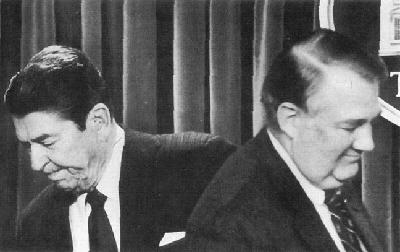
Four years after Reagan left
office, more of the truth
would come out. In 1992, former defense secretary
Casper Weinberger was ordered to turn over notes of a January 1986
White House meeting. Weinberger's notes said, "President decided to go with Israeli-Iranian offer to release
our 5 hostages in return for sale of 4,000 TOWs [U.S. missiles] to
Iran by Israel. George Shultz + I opposed--Bill Casey, Ed Meese + VP
favored--as did Poindexter."
Before leaving office in 1992,
then-president George Bush pardoned Weinberger and five others who were facing
felony charges
stemming from Iran-contra. The Bush pardons effectively ended the
Iran-contra investigation.
"If the American people ever find out what we have done, they will chase us down the streets and lynch us."
--George H. W. Bush, to White House correspondent Sarah McClendon, June 1992, in response to the question, "What will the people do if they ever find out the truth about Iraq-gate and Iran-contra?"
Right-Wing
Subversives Masquerading as Patriots
There were some disturbing similarities between
Oliver North
testifying before the U.S. Congress in 1987 and Adolph Hitler testifying
during his trial in Germany in 1923. Both North and Hitler assumed
the stance of self-righteous patriots to justify their illegal,
unconstitutional activities. And both achieved celebrity status, winning sympathy
from a large section of the public, especially those on the political
Right.
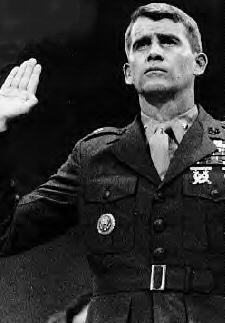
Oliver North was convicted in 1989
of destroying documents and obstructing Congress. Later, the
country of Costa Rica banned him for having aided drug traffickers
who were selling arms to the contras.
|

Adolph Hitler in 1925 after his
release from Landsberg prison. He was sent to prison for
attempting to take over the government of Germany. The
attempt failed in what would later be called "The Beer Hall
Putsch."
|
David Hackworth on Oliver North
Oliver North's Plan to Suspend the Constitution and Declare Martial Law
The Ronald Reagan Years -
The Real Reagan Record
by Mark Tracy
|